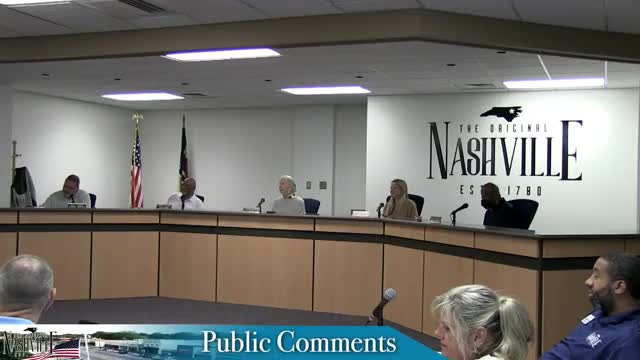Nashville council to pursue research, community outreach on local historic-preservation commission after state presentation
Get AI-powered insights, summaries, and transcripts
Subscribe
Summary
After a presentation from the North Carolina State Historic Preservation Office and several public comments urging protection of downtown homes, the Town of Nashville council voted Oct. 22 to receive the presentation and move forward with research and community engagement on creating a local historic preservation commission and potential district.
NASHVILLE, N.C. — The Town of Nashville council voted Oct. 22 to receive a presentation from the North Carolina State Historic Preservation Office and to begin researching a local historic preservation commission and community engagement process, including a proposed town-hall meeting.
The decision followed public comments urging the council to act to protect properties in the town's National Register historic district and a 45-minute staff presentation explaining differences between federal and local historic-designation tools.
Local residents described recent demolitions and neglect in the downtown historic district as permanent losses to Nashville’s character. "When you drive through Nashville, what do you see? ... The tree lined streets of downtown, the beautiful historic homes," said Anna Joyner, identifying herself as a local realtor. Virginia Buzynski, who said she lives adjacent to the house at 111 South Hilliard Street, told the council: "This is not just any building. It represents a tangible link to our town's past... Losing this home would be a permanent loss to Nashville's heritage." Newer resident Brianna Miller said she moved to the area in part because of the quantity of historic properties and asked the council to "please prioritize the preservation of these important parts of this town." Randy Shackleford spoke about the value of homes as the origin of local stories and community identity.
State Historic Preservation Office representative Christie Brantley described three levels of designation: National Historic Landmarks, the National Register of Historic Places and local designation. She said the National Register is an honorary, federal listing that "is not regulated. There's no restrictions," while local designation carries enforceable local review through certificates of appropriateness (COAs). She explained that a local historic-preservation commission can require a COA for exterior work and may delay demolition for up to 365 days to allow options such as relocation or salvage. Brantley also discussed the Certified Local Government (CLG) program, potential eligibility for tax-credit projects, and the state's role in training and grants.
Council discussion and questioning focused on procedure and limits: whether property owners must consent, what a local district would require, and whether local designation can prevent demolition. Brantley said property owners do not have to consent under current law and that a local designation would be enacted by ordinance as a zoning overlay, which would require COAs for exterior changes. She added that permanent protection from demolition would normally require owner-held easements, covenants or an application for statewide significance handled through a separate state process; she cited Cooley Manor as an example of statewide-significant property.
After questions and a request to bring a community meeting, the council voted to "receive the presentation and move forward" with additional research, public engagement (including a town-hall meeting), and follow-up work to evaluate whether to establish a local historic-preservation commission or district. The motion passed by voice vote.
The council and staff said they will schedule a separate evening town-hall session to allow broader public comment and to answer questions about the local-designation process and potential design standards. Brantley offered state staff support and said the Preservation Office would return for follow-up public meetings if requested.
The council’s vote directs staff to research legal steps, community engagement plans and any required notices or reports to the state as part of next steps. No ordinance or binding local designation was adopted at the Oct. 22 meeting.
